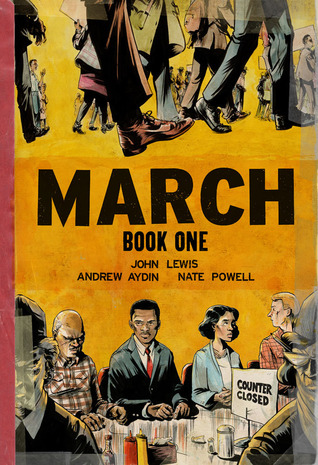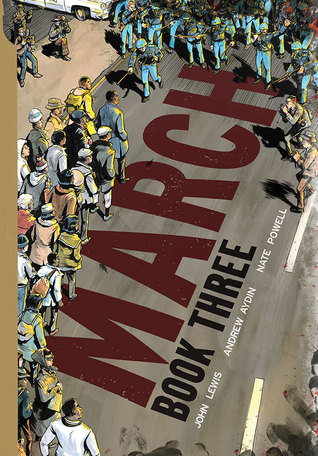SERIES THURSDAY: March by John Lewis, Andrew Aydin, Nate Powell
ABOUT THE BOOK
Congressman John Lewis (GA-5) is an American icon, one of the key figures of the civil rights movement. His commitment to justice and nonviolence has taken him from an Alabama sharecropper’s farm to the halls of Congress, from a segregated schoolroom to the 1963 March on Washington, and from receiving beatings from state troopers to receiving the Medal of Freedom from the first African-American president.
Now, to share his remarkable story with new generations, Lewis presents March, a graphic novel trilogy, in collaboration with co-writer Andrew Aydin and New York Times best-selling artist Nate Powell (winner of the Eisner Award and LA Times Book Prize finalist for Swallow Me Whole).
March is a vivid first-hand account of John Lewis’ lifelong struggle for civil and human rights, meditating in the modern age on the distance traveled since the days of Jim Crow and segregation. Rooted in Lewis’ personal story, it also reflects on the highs and lows of the broader civil rights movement.
Book One spans John Lewis’ youth in rural Alabama, his life-changing meeting with Martin Luther King, Jr., the birth of the Nashville Student Movement, and their battle to tear down segregation through nonviolent lunch counter sit-ins, building to a stunning climax on the steps of City Hall.
Many years ago, John Lewis and other student activists drew inspiration from the 1950s comic book "Martin Luther King and the Montgomery Story." Now, his own comics bring those days to life for a new audience, testifying to a movement whose echoes will be heard for generations.
REVIEW
Lewis's life reads like a novel, but its real. This graphic novel provides a powerful account of the beginning of Lewis' involvement with the Civil Rights movement of the 1960s. While I'd read about some of these events, somehow, the first person account brings it to life like no other book I've ever read. Frankly, some of the things that Lewis and his colleagues faced made me sick. And never having faced this sort of thing myself, it's hard for me to comprehend such prejudice and the actions that accompany it. The graphic novel format works particularly well for a story like this one as the illustrations are particularly powerful, especially in black and white. There are no extras here, no fluff, just a powerful story told in a straightforward manner.
ABOUT THE BOOK
The #1 New York Times bestselling series continues! Congressman John Lewis, an American icon and one of the key figures of the civil rights movement, continues his award-winning graphic novel trilogy with co-writer Andrew Aydin and artist Nate Powell, inspired by a 1950s comic book that helped prepare his own generation to join the struggle. Now, March brings the lessons of history to vivid life for a new generation, urgently relevant for today's world.
After the success of the Nashville sit-in campaign, John Lewis is more committed than ever to changing the world through nonviolence - but as he and his fellow Freedom Riders board a bus into the vicious heart of the deep south, they will be tested like never before.
Faced with beatings, police brutality, imprisonment, arson, and even murder, the young activists of the movement struggle with internal conflicts as well. But their courage will attract the notice of powerful allies, from Martin Luther King, Jr. to Attorney General Robert F. Kennedy... and once Lewis is elected chairman of the Student Nonviolent Coordinating Committee, this 23-year-old will be thrust into the national spotlight, becoming one of the "Big Six" leaders of the civil rights movement and a central figure in the landmark 1963 March on Washington for Jobs and Freedom.
REVIEW
I thought the first book in this series was powerful, but this book is even more powerful. Reading about the Freedom Riders and the things they experienced in standing up for their rights left me stunned. I knew about some of this, but seeing it in the illustrations just brought it home strongly. The story is told so well and the contrast between Lewis's presence at Obama's inauguration and the brutality that he faced as a young man with his colleagues is a powerful one. That doesn't mean I would hand this to young readers however. I'd say middle school at the youngest. The story includes insulting prejudicial language and some graphic violence, which couldn't be told any other way since its the truth. The inclusion of Lewis' original speech made for an interesting comparison between what he planned to say and what he ended up saying. His original speech was definitely fiery but not necessarily helpful, the few tweaks that were made, made the speech all the more effective.
ABOUT THE BOOK
Welcome to the stunning conclusion of the award-winning and best-selling MARCH trilogy. Congressman John Lewis, an American icon and one of the key figures of the civil rights movement, joins co-writer Andrew Aydin and artist Nate Powell to bring the lessons of history to vivid life for a new generation, urgently relevant for today's world.
REVIEW
After reading this, I can very easily understand why it won so many awards. This book tells a powerful story, but not necessarily an easy one to read, which is why I wouldn't hand it to anyone under the age of 12-14. This book takes up where the second book ended, continuing Congressman John Lewis's story of the events leading up to the second Selma to Montgomery March and the passing of the Voting Rights Act of 1965. The combination of text and visuals makes this a particularly emotional read. Even though I was aware of some of what happened during the Civil Rights struggles of the 1960s, seeing it visually represented, and hearing John's story told so well, made it more impactful. This is a story of courage, and hope, and passion, but it's also a story of fear, and anger and violence. Some of the awful language and graphic violence is hard to take, especially with the marchers refusing to fight back. But I've long believed and this series has cemented that belief, that it was the nonviolent approach in the face of often brutal violence and hatred, that finally carried the day. An amazing end to an amazing series that documents a time in the United States history that needs to be remembered, especially since the journey continues today.






Comments
Post a Comment